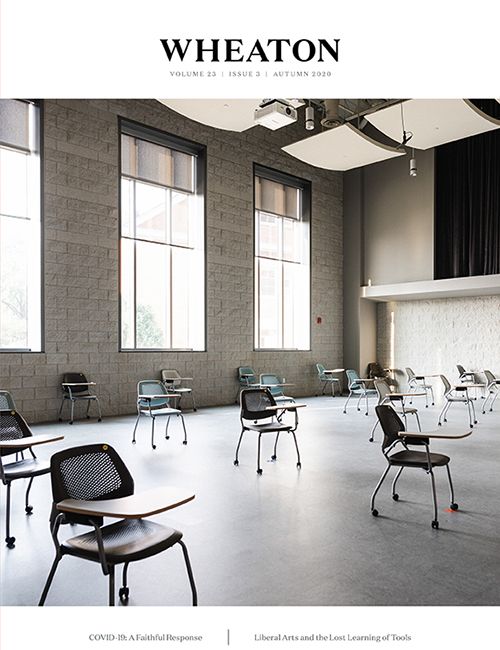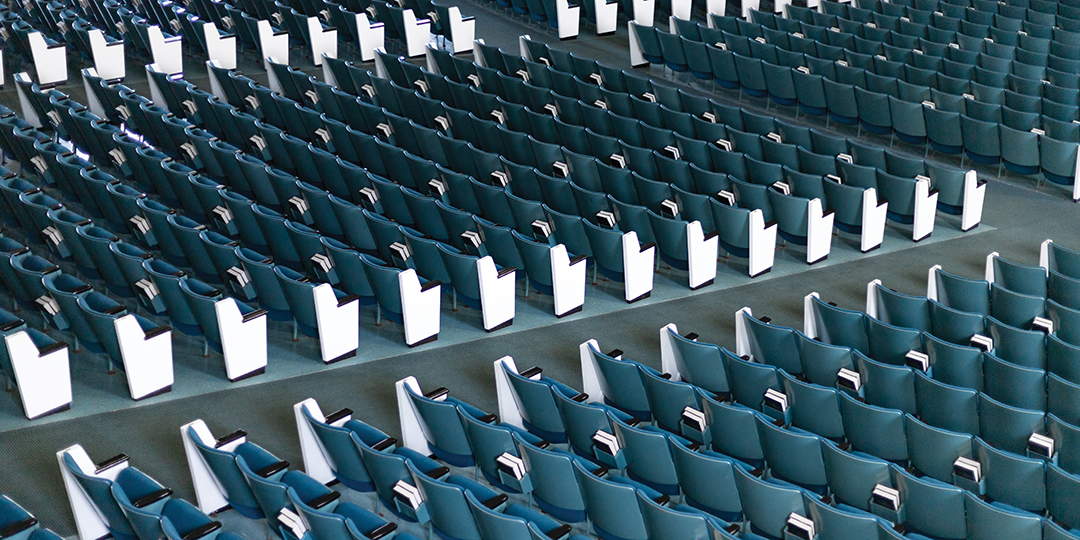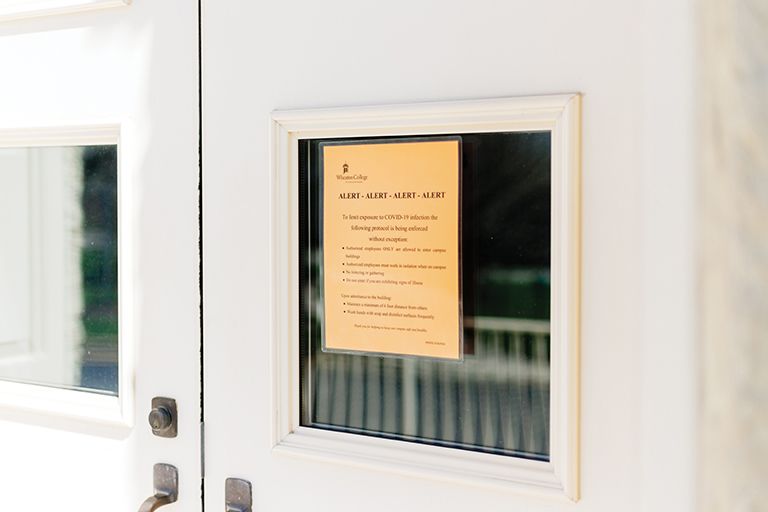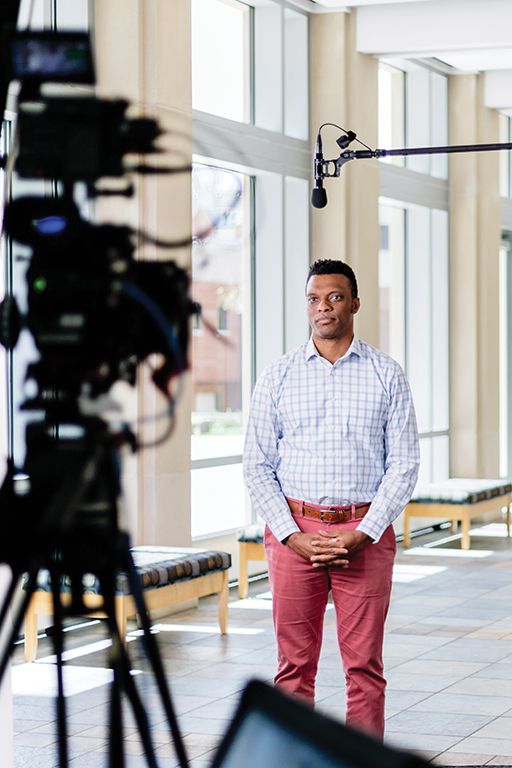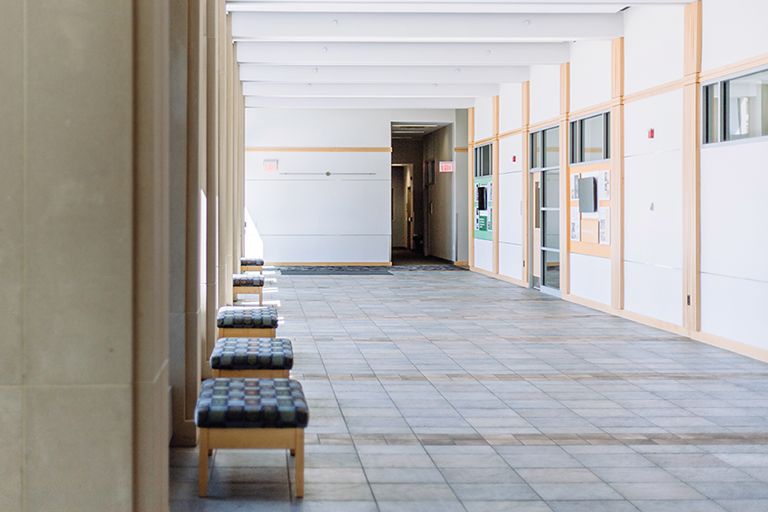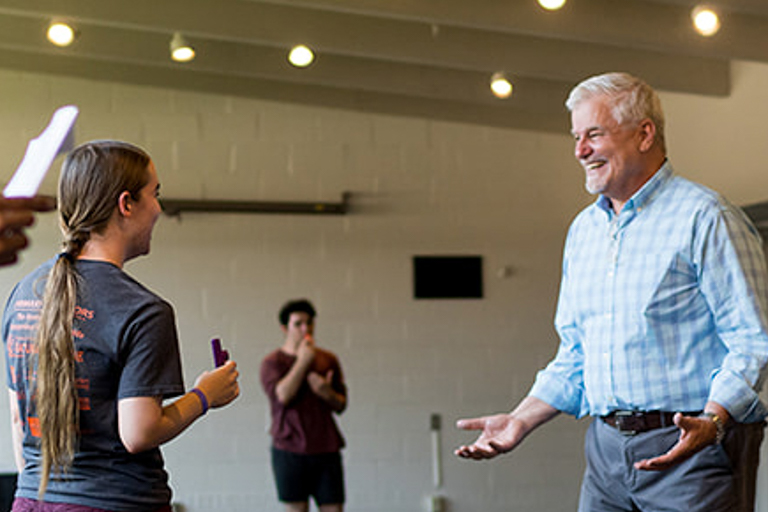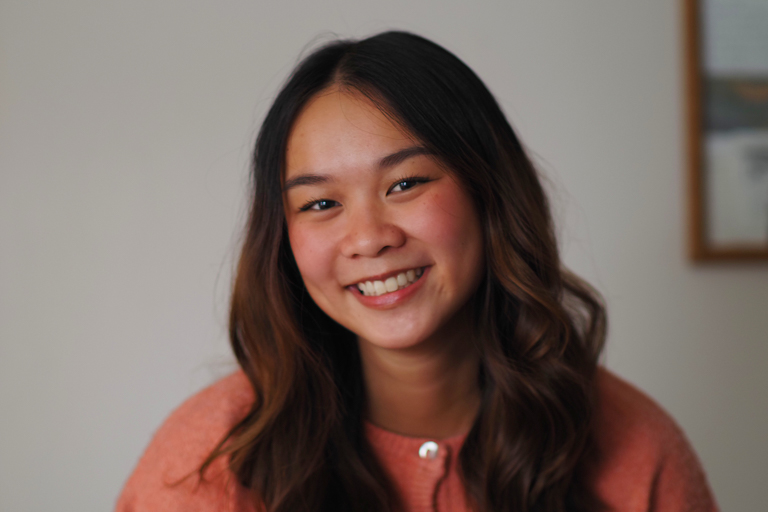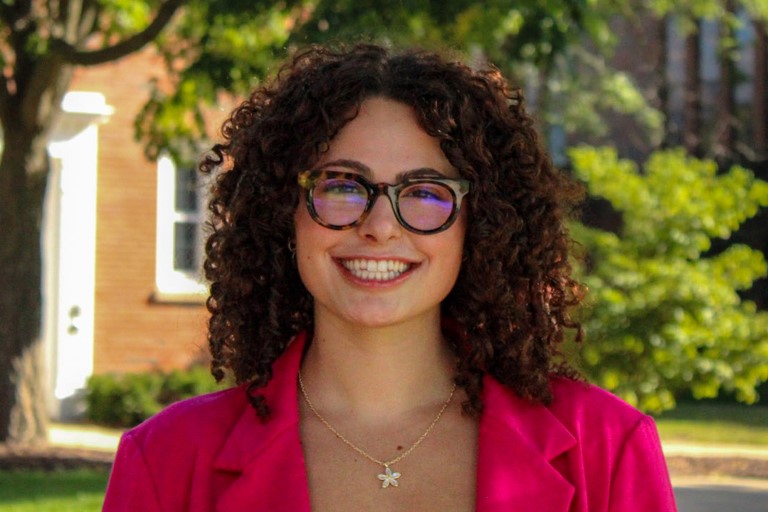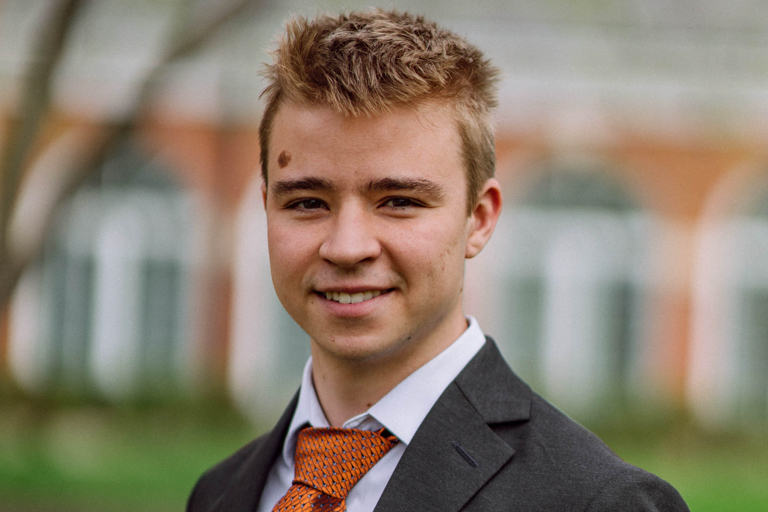COVID-19: A Faithful Response
Teamwork, collaboration, and adaptability characterize Wheaton's evolving response to a global pandemic
Words: Allison Althoff Steinke ’11
Photos: Diana Sokolov
The novel coronavirus presented Wheaton College with an unprecedented challenge: to prepare for and respond to a global pandemic. For the first time in Wheaton’s history, the entire College moved to online teaching, learning, and working—in a matter of days. In March 2020, as federal and state authorities developed guidelines to address the spread of COVID-19 in communities across the United States, Wheaton was one of the first higher education institutions in the State of Illinois to make the decision to move to online learning and operations. This was a decision made with a mix of sadness, urgency, and cooperation, with the well-being of over 2,000 students and millions of dollars of revenue hanging in the balance.
While tensions over coronavirus response escalated in the United States, students, faculty, and staff spending their Spring Break in the mountains of Planes de Jalan, Honduras, remained remote, healthy, and protected.
“We had no idea what was going on around the globe,” Honduras Project Director Lydia Griffith ’20 remarked. “We missed the memo.”
Lydia, along with Honduras Project adviser Dr. Steve Ivester ’93, M.A. ’03, eventually received via satellite phone the message from Wheaton to return to the United States immediately. The Honduras Project team arrived safely back on Sunday, March 15, a mere eight hours before Honduras closed its borders and restricted all outgoing and incoming travel at midnight on Monday, March 16.
“We are grateful to God for his protection of our week,” Lydia said. “Despite the confusion and uncertainty awaiting each of us when we returned to campus, everyone remained in high spirits, and we found ourselves united with one another, confident that we were returning to campus after having tasted and seen the goodness of the Lord revealed to us in one another and in the Honduran community in Planes de Jalan, who welcomed us so generously.”
A COOL, CALM, AND COORDINATED CAMPUS RESPONSE
College leadership began to consider the growing implications of the virus’s growth in February, which at that time was largely concentrated in China. College officials discussed how the virus might impact international students’ ability to make it home for the summer. They also had concerns about families traveling from around the globe to celebrate Commencement and began to discuss various scenarios that might arise as a result of hundreds of students, faculty, and staff returning from spring break trips worldwide. In late February, the College’s Senior Administrative Cabinet (SAC) had an explicit discussion about these growing implications and the need for a coordinated effort with representation from areas across campus to think through the implications and response as necessary.
Tasked with leading the formation of a COVID-19 response team, Vice President for Finance and Operations Chad Rynbrandt ’94 pulled together 14 Wheaton staff members from departments across campus, including Academic and Institutional Technology, Facilities Management, Global and Experiential Learning, Marketing Communications, and others.
While it felt like the world was caving in, Wheaton’s leaders forged ahead with a characteristic, yet uncommon, coolheaded confidence. The team began to meet on a daily basis in a “War Room” configuration that enabled small group breakouts and quick decision-making.
“We had a cabinet discussion in late February about how to respond, and the response team’s first meeting was March 5,” Rynbrandt says. “We very quickly organized ourselves and started capturing all the questions we needed to answer. We saw things develop quickly in the succeeding days after March 5, and we got into a cadence of starting each day together.”
This War Room configuration allowed college leadership to make a series of forward-looking decisions. Often when a new Illinois state order was implemented, Wheaton had already made preparations in anticipation of what might be required.
“It was an incredibly dynamic and inspiring environment,” Rynbrandt notes. “Cross-campus teamwork and quick decision-making allowed us to not just react, but to be a couple steps ahead of the fast-breaking news.”
On March 11th, President Ryken ’88 made the public statement that the College would extend spring break for one week and move to online and remote learning and operations for the rest of the spring semester. This decision was not made lightly. It wasn’t a small shift, either, largely due to Wheaton’s deep commitment to residential Christian liberal arts education. Assistant Provost for Academic Affairs and Assistant Professor of Core Studies and History Dr. Sarah Miglio M.A. ’04 notes that the transition to online coursework and operations came with grief and lament.
We very quickly organized ourselves and started capturing all the questions we needed to answer.
“Learning and living at Wheaton involves so many different things—small groups, Student Government, classroom experiences. It’s a beautiful thing to think about how much of that takes place in face-to-face, embodied experiences. When we realized we didn’t have a way we could do any of that safely in person, there was real sorrow and a sense of genuine loss,” Dr. Miglio said.
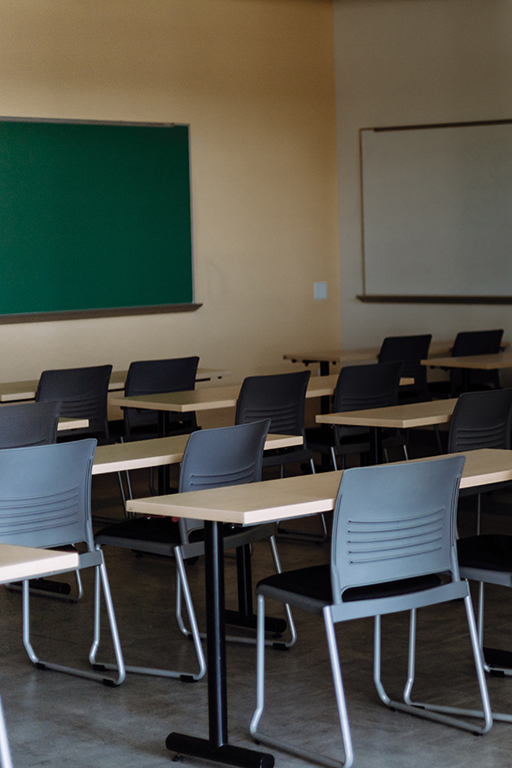
Classroom in Meyer Science Building
After courses moved online for the duration of the semester, Alumni Weekend reunions were canceled; students were given financial credit for B-quad housing, dining, and parking; faculty and staff began to work remotely; summer ministry and “Wheaton In” programs were canceled; more than 900 courses began via remote instruction; chapel services began online; and free medical and mental healthcare became available to students through Student Health Services.
“It took some courage for us institutionally to make the decision we did, given all the uncertainty,” Rynbrandt says. “We tried to lean forward rather than react. Every day brought new scenarios we needed to make quick decisions on. One of the biggest challenges was, on a day-today basis, to make sure we were being responsive to all of the various questions that came up.”
Wheaton’s Chief Information and Campus Services Officer Wendy Woodward said the transition to remote learning and operations was a process of activating the tools and resources that have been put in place over the past five years in a way that facilitated the quick transition. As the Academic and Institutional Technology representative on Wheaton’s 14-member COVID-19 response team, she moved quickly to mobilize the College’s technological resources and staff.
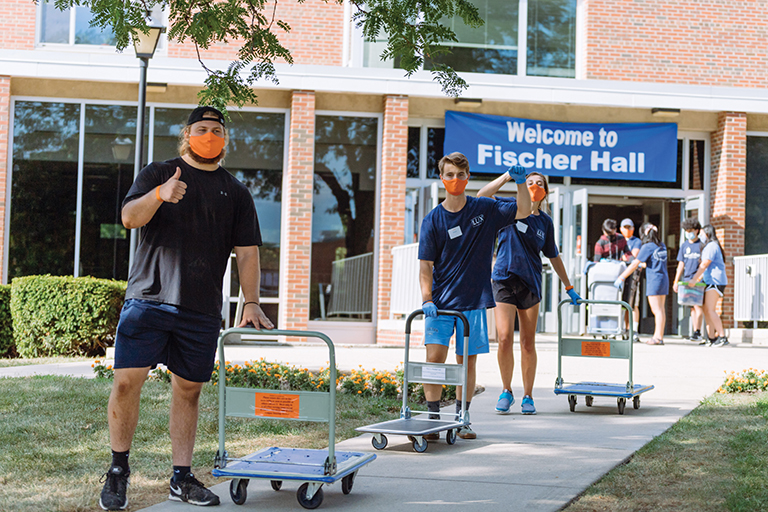
Thunder Move-in teams practiced COVID-Safe, Thunder-Strong guidelines while assisting students during check-in.
“Our goal is to help the College be as successful as we can be in this crisis by thinking in new and different ways,” Woodward said. “We are focusing our conversations with faculty on supporting them as they work to deliver an exceptional liberal arts learning experience while transitioning to a fully online modality. Our faculty have been amazing in their willingness to respond quickly.”
COVID-19 impacted students, faculty, and staff on campus, but also went beyond the bounds of campus, as Wheaton had Human Needs and Global Resources (HNGR) interns and Fulbright scholars spread across the globe. As campus operations moved online, College officials also reached out to the local community by providing temporary housing for frontline emergency workers in vacated Terrace Apartments. Up north in Three Lakes, Wisconsin, the HoneyRock Outdoor Center for Leadership Development of Wheaton College reached out to their local community as they delivered 90 loaves of homemade bread to Northwoods Share, a local community resource center.
The College’s Centers and Institutes responded to global needs proactively as well. The Humanitarian Disaster Institute (HDI) co-hosted a COVID-19 Church Online Summit with the National Association of Evangelicals; the Billy Graham Center’s Stetzer Leadership Podcast featured interviews with global leaders; and HDI and the BGC provided various guides and resources for churches on their websites.
Beyond faculty, students, and staff, there was a parent and alumni angle that had to be addressed, along with significant financial implications. While the College boasts a nearly $500 million endowment, it is a safety net that would only be accessed in case of emergency.
“While we want to protect the endowment so it continues to sustain our mission into the future if there is an extreme financial need, it is there to potentially support us through a difficult time,” Rynbrandt says. “That would be a very sobering proposal to make, and something that would require trustee support and approval to do. As I look at our situation and construct various financial scenarios, it’s reassuring to know that in the event we needed to, it is a request we could make. I have a lot of counterparts at other schools who may not have that resource like the Lord has provided here at Wheaton.”
FACULTY RESPONSE: THE TRANSITION TO ONLINE LEARNING
As campus officials worked to move over 900 courses and operations online, the Faculty Governance Technology Group utilized their Technology Information Resource (TIR) subcommittee, led by Dr. Matt Lundin ’96, to help fellow faculty members think about how they could adapt the in-person classroom experience and add a layer of mediation with online tools, including Schoology, Zoom, and Google Suite.
“For faculty to take half of the semester they’d designed and transform it on a dime into something that would work in a technologically mediated classroom experience is a tremendous amount of work,” Dr. Miglio said. “They did it with creativity and incredible expertise.”
Associate Professor of Physics Dr. Heather Whitney was able to adapt natural science courses to a remote learning format for the duration of the semester. Dr. Whitney notes that pivoting to virtual laboratory sessions was a “big challenge.” Faculty acted quickly to identify simulations available online and created videos of themselves doing lab experiments with lesson plans that directed the students to use those simulations and videos to meet learning outcomes through projects and lab meetings on digital workspaces and platforms.
“When we transitioned to remote learning, I thought a lot about how I could maintain the values behind my classroom teaching practices and put them into action with remote learning tools,” Dr. Whitney says. “Many of us also connected with faculty at other institutions to share resources and ideas, a treasured means of goodwill and support that benefited all of our students.”
Extracurricularly, student groups, including the Society of Physics Students, kept up their weekly meetings through Google Meet, and the Sigma Pi Sigma Honors Induction was held over Zoom, allowing alumni from all over the world, including Malaysia, to attend. Dr. Whitney had an honors student defend his thesis over Zoom in April, which allowed numerous friends and family to attend the defense.
“It was disappointing to not be able to hold it in person, but he did a really great job, and many more friends and family were able to see his presentation than would have been otherwise possible had it been held on campus,” Dr. Whitney said. “We take note of and are grateful for these bright spots in such a challenging time.”
In addition to adapting courses and research projects to an online format, faculty rallied to adapt curriculum tailored to the quickly evolving pandemic. Dr. Amy Reynolds and Dr. Kristen Page adapted their Advanced Integrative Seminar on global health to contain content tailored to coronavirus; Dr. Ryan Kemp’s philosophy seminar on existentialism integrated The Plague by Albert Camus; and Lundin’s senior seminar for history majors required students to complete a collaborative project: a pandemic archive of Wheaton College during the COVID-19 pandemic. This project enabled students to learn about public history, collection of artifacts, and tangible methods to gather people’s experiences and memories in a relevant and adaptive way.
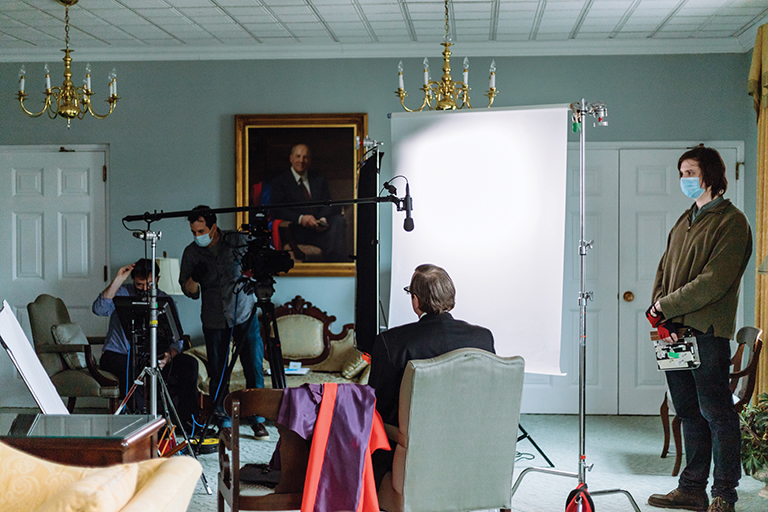
President Ryken was filmed for the virtual celebrations of graduates.
“Faculty have done an amazing job finding ways not to be defeated by the disruption, but to leverage the disruption for a meaningful educational experience,” Dr. Miglio said.
Professor of Music and Director of Performance Studies Dr. Mary Hopper ’73 noted that, while ensemble rehearsals and performances were virtually impossible, private lessons, banquets, and recitals occurred via Zoom and FaceTime.
“We are trying to be creative and thinking about how we can continue to serve our students,” Dr. Hopper said. “The Women’s Chorale did a little virtual choir—it was a fun project for them, but it involves singing by yourself, which made some uncomfortable. In addition to making music together, an ensemble also has a strong community aspect, so we tried to keep that going. We had weekly Zoom calls with everyone, played some games, had guests, and did elections for next year.”
In June 2020, faculty provided a free, one-credit pass/ fail course called “Living and Learning in the Time of COVID-19” for incoming first-year and transfer students. The course included modules on infectious diseases, Christian responses to plagues, theodicy, lament, service and justice, self-care, and resiliency. During the upcoming academic year, there are proposals for courses to be offered about pandemics and plagues in departments ranging from biology to history.
The 2020-21 academic year will look different than any other semester in Wheaton’s history. College leadership considered a number of options, including a return to “business as normal”; all-online instruction; and hybrid options involving both online and in-person instruction and operations. Wheaton ultimately chose to start the fall 2020 semester as scheduled on August 26 and to end on-campus instruction at the time of Thanksgiving break. The semester is planned to conclude with two weeks of remote learning after Thanksgiving break, with students taking online finals between December 15 and 17. In a video announcement about the fall 2020 semester, President Ryken encouraged the Wheaton family to be “maximally flexible” and “uncommonly charitable” as the College works together with state and federal guidelines as the semester unfolds.
“How can we provide a Wheaton experience even if it’s not on campus?” Dr. Miglio asked. “We love our students. We care about their learning and their whole-person development, and we want to see them flourish. We cheer them on when they graduate and meet their goals. Faculty have provided incredible examples of this, whether it’s through getting up early to hold office hours with students in South Korea, coaching students in virtual office hours, or through encouragement and prayer.”
Beyond planning for fall 2020, Woodward and other College officials are “trying to be two steps ahead” by thinking about options on the table for spring 2021 and beyond.
“What is the new normal? Even when we open campus, we will need an educational content delivery pathway that remains virtual,” Woodward said. “We are trying to figure out where the right place to land is, not only this fall but also in the long term as we now have the opportunity to explore how to best use the new skills that our faculty have acquired during the pandemic while staying true to our pedagogical values.”
For example, in the natural sciences, Dr. Whitney said faculty are preparing for a variety of scenarios such as: How many students can safely work in a laboratory, given social-distancing guidelines and the tasks performed in a lab setting? In the Conservatory of Music, Dr. Hopper said faculty have discussed the possibility of producing a film for the opera production, and she is exploring some music that was sung by women in a WWII internment camp for the Women’s Chorale to attempt and study.
STUDENT RESPONSE: THE TRANSITION TO ONLINE LEARNING
Wheaton is a residential liberal arts college committed to embodied experiences in a physical community, and the transition to online learning was heart-wrenching for many members of the class of 2020. Student Body Vice President Nat Lewis ’20 graduated with a major in English, and was especially moved by the gestures Dr. Nicole Mazzarella, associate professor of English, made for students completing the semester from a distance. As one example, Dr. Mazzarella took photographs of the English Department in Blanchard Hall and uploaded them to the class site online so students could retain a sense of physical place as they completed assignments online.
“She was amazing,” Lewis said. “She went above and beyond in anticipating the waves of emotion that came and were unpredictable. She exhibited an amount of care, forethought, and perceptiveness in contributing to our experiences. Little examples of care were huge.”
Missing physical Commencement—online recognitions were broadcast on May 9 and 10—and other markers like moving out of campus housing and ending campus clubs and organizations for the year were bittersweet experiences.
“It is so sweet on one hand to be able to have experiences mimicking the closure of in-person ceremonies, but so painful on the other to close your laptop and be alone,” Lewis said. “There have been so many moments like that. Every student will be able to relate to that on some level, but seniors have been impacted specifically in a unique and encompassing way.”
Even in the midst of unexpected challenges and loss, Lewis noted that the support and encouragement from faculty and staff has been tangibly felt.
“People have been so encouraging and have offered a profound sense of support for our graduating class during this tough time,” Lewis said. “I’m seeing people utilizing their connections and thinking, ‘Who are the people in my life that may need any support I can offer?’”
As one example of this support, the Center for Vocation and Career (CVC) recently created a mentorship program called “Career Communities.” This program paired 30 young alumni volunteers to mentor 91 members of the class of 2020 moving forward.
“We wanted to give recent graduates the support and encouragement we knew they would need,” Director of the CVC Dee Pierce M.A. ’17 said. “Our alumni have always been so generous, and this situation was no different. The best way to stand out in a competitive market is by knowing someone in the organization. Helping our May 2020 graduates grow their connections through the Wheaton alumni network is just one way we can help them position themselves well for this challenging season.”
Beyond Career Communities, the CVC is also developing a program called “mySkills Project 2020,” designed to replace internship experiences many students lost or were never able to secure.
NEXT STEPS
Historically, Wheaton College has weathered storms such as the Civil War, the 1918 influenza pandemic, two World Wars, the Great Depression, the Vietnam War, the Korean War, and the Great Recession. In this season, the challenge is coronavirus.
“Part of the Lord’s provision is through the talented people he’s brought here,” Rynbrandt says. “There’s also this historical provision through similar crises. I’m reminded of how the Lord has been so faithful in providing for the College since 1860. There have been wars, other pandemics, and other economic crises. Through faithful leadership, the Lord continues to provide. I trust He will do the same for us.”
